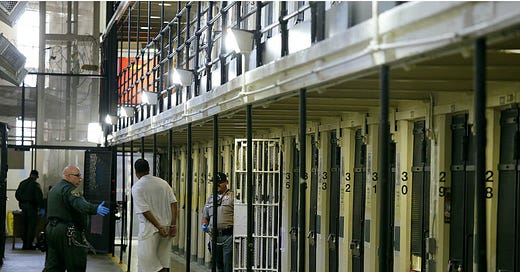Post-conviction purgatory, psychic con, Skibidi Toilet
Ownership rights to a viral YouTube series are being hashed out in a California court.

Whether it’s accompanied by new evidence, DNA testing or witnesses coming forward, the road to exoneration is paved with years of arduous litigation. The average wrongfully convicted person loses a decade of their life behind bars, while they’re forced to learn the legal system and advocate for their own innocence.
“A lot of exonerations are just luck,” researcher Maurice Possley told Amanda Pampuro. “Serendipity.”
The National Registry of Exonerations estimates 2% of people have been wrongfully convicted of felonies, meaning more than 20,000 innocent people in jail. Other researchers say the figure is closer to 5%.
What’s missing in the exoneration data are false confessions or guilty pleas born of coercion or corruption, Possley said.
In the latest Sidebar episode, Pampuro and co-host Kelsey Reichmann explore what it takes to clear one’s name and pose the question: Is innocence enough?
Listen and subscribe on Apple Podcasts, Spotify and YouTube.
More Courthouse News below.
Here’s what else happened in court this week:

The Supreme Court refused to extend a pause on foreign aid funding, forcing President Donald Trump to comply with a federal judge's order to restart disbursements for the U.S. Agency for International Development contractors. [Kelsey Reichmann]
Too slow: The EU’s highest court fined five countries millions of dollars for failing to quickly adopt regulations protecting whistleblowers. [Molly Quell]
De-famous: Jay-Z filed a defamation lawsuit in response to now-dropped claims that he sexually assaulted a 13-year-old after the MTV Video Music Awards in 2000. [Gabriel Tynes, Nika Schoonover]
No cap: In California federal court, parties sparred over the rights to the viral YouTube series "Skibidi Toilet."
Mimicking Mouse? At trial in Los Angeles, a director for Disney rejected the idea that his team plagiarized a story about the mythological adventures of a teenage Polynesian surfer to create "Moana." [Edvard Pettersson]
Free free press: A Stanford University student journalist won’t face charges stemming from his arrest last year while reporting on a pro-Palestine protest. [Matt Simons]
Top 8: What you’ve been reading
Dems demand details from AG Bondi on Trump’s directive to review gun regulations
North Carolina Senate cracks down on illegal immigration, phones in schools
High court tips the scales against veterans seeking disability benefits
Minnesota Supreme Court skeptical high penalties for unemployment fraud are unconstitutional
Contractors urge Supreme Court to hold Trump accountable after he cuts off foreign aid
Second Circuit eradicates Amish fight over NY school vaccination mandate
Upscale milk brand Fairlife accused of animal abuse, environmental wrongs
Despite apology, Hawaii mobster gets 9 years for role in crime syndicate
Spotlight: U.S. Circuit Court of Appeals
The Second Circuit pondered whether a Canadian con man’s psychic racket caused intangible harms to customers — or intangible benefits to those who felt a personal awakening. [Erik Uebelacker]
Two wine enthusiasts lost at the Ninth Circuit, which found Arizona’s requirement for direct-shipping wine to customers doesn’t violate Constitution. [Joe Duhownik]
The 10th Circuit rejected a petition to review the EPA’s approval of a Colorado air pollution cleanup plan. [Amanda Pampuro]
Rulings on our radar 📡
» Northern District of California: 7-Eleven will pay $8.75 million to settle customers’ claims filed over its sale of Feel Free, a tonic beverage containing the addictive ingredient kratom.
» Eastern District of California: The court issued a permanent injunction against Six Flags after a deaf employee sued for failing to provide him an ASL interpreter.
» Southern District of California: San Diego must face false arrest claims from a freelance photojournalist who accuses them of taking his camera, keys and documents and then jailing him for 16 hours in retaliation for filming police activity.
» Denver City & County District Court: The 72-year-old Denver Nuggets superfan who sued after she was banned from attending home games — which she did nearly continuously from 1992 until her 2024 ban from the arena — lost summary judgment on her three claims.



